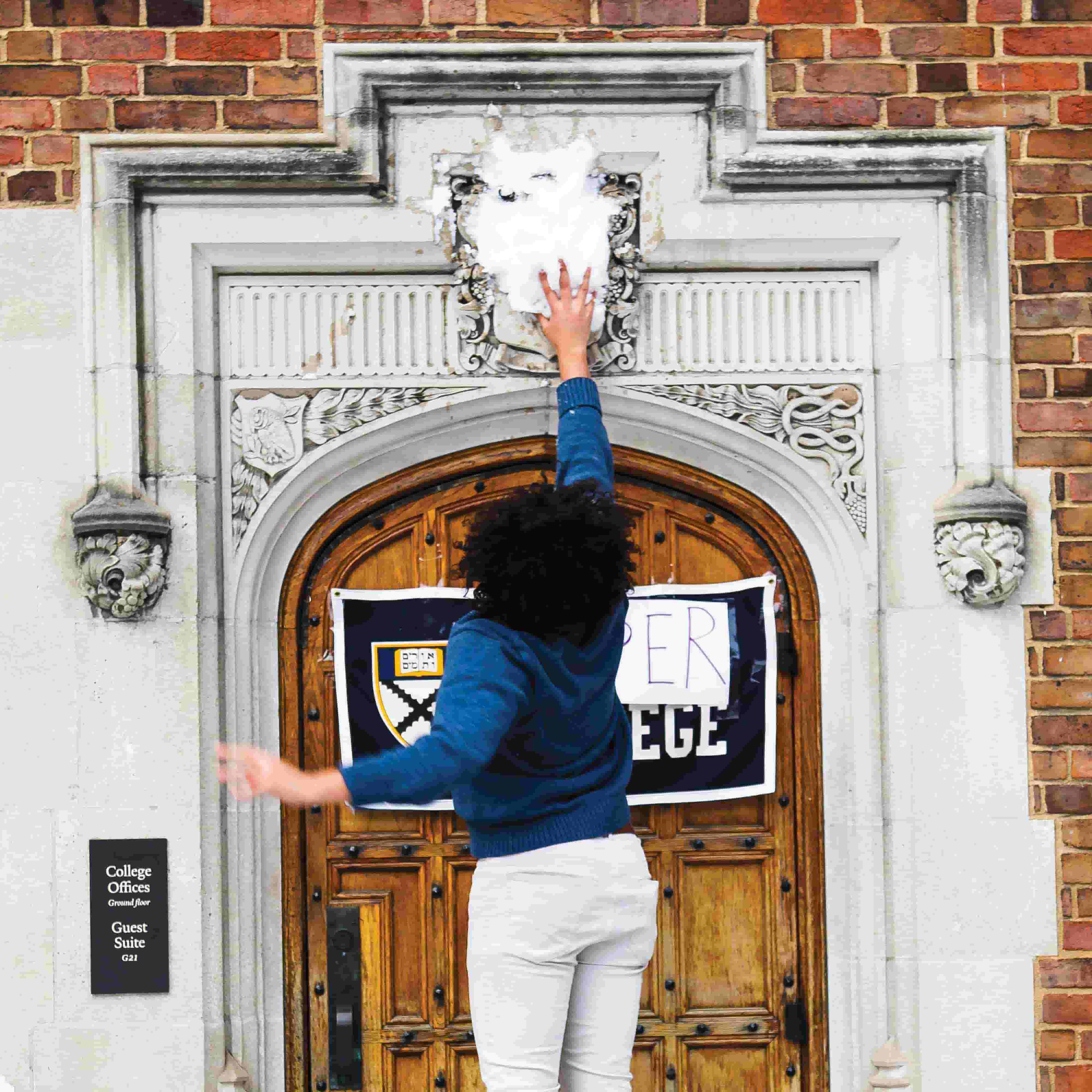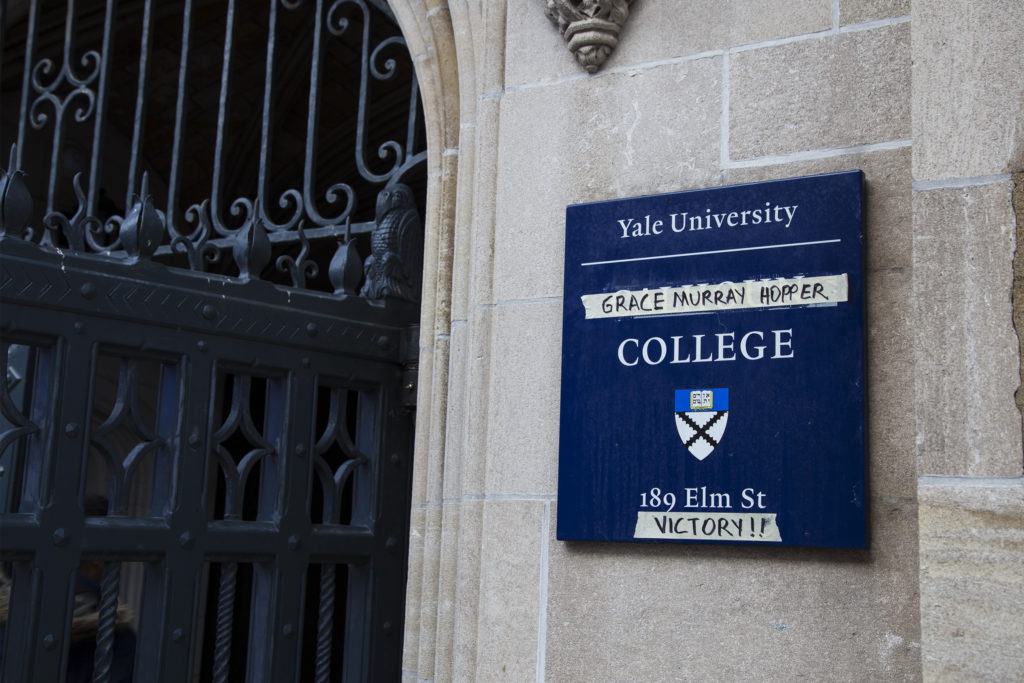
Calhoun College will be renamed in honor of Grace Hopper GRD ’34, a United States Navy Rear Admiral who made pivotal advances in computer science, University President Peter Salovey announced Saturday.
The announcement, which arrives 86 years after the college was named after statesman and slavery advocate and class of 1804 graduate John C. Calhoun, reverses Yale’s controversial decision last April to retain the Calhoun name despite months of campus protests. It also marks the culmination of decades of debate over the naming of Calhoun and the first time in Yale’s 316-year history that the University has renamed a building because of the legacy of its namesake.
Salovey announced the change, which takes effect on July 1, in an email to the campus community a day after the Yale Corporation voted to approve the recommendation of a task force charged with applying broad renaming principles to the Calhoun dispute.
“The decision to change a college’s name is not one we take lightly,” Salovey wrote. “But John C. Calhoun’s legacy as a white supremacist and a national leader who passionately supported slavery as a ‘positive good’ fundamentally conflicts with Yale’s mission and values.”
Hopper, who invented the first compiler for a computer programming language and posthumously received the Presidential Medal of Freedom in 2016, will become the second woman to be honored as a residential college namesake after Anna Pauline Murray LAW ’65. Salovey said he and the Corporation did not choose from an official shortlist of names.
“We considered many names nominated from many rounds of outreach and considered them in many contexts,” Salovey told the News. “Over the recent years, we’ve had hundreds of names — people of all walks of life and cultural backgrounds — suggested and considered. We are looking for people who represent Yale’s values, distinguish themselves in their fields and inspire our community through leadership and service.”
According to a communitywide email from Yale College Dean Jonathan Holloway, the class of 2017 will have the option to graduate as members of either Calhoun or Hopper during Commencement in May. But all current juniors will graduate as Hopper students, and incoming freshmen will be placed into Hopper College, Holloway said.
Salovey told the News that alumni will be allowed to continue associating themselves with the original college name, by having “Calhoun” rather than “Hopper” written on their badges at reunions, for example. But alumni will also have the option of changing their affiliation to Hopper College in the alumni database.
In his interview, Salovey said he still believes that renaming buildings could erase Yale’s history, but described the Calhoun decision as a rare and possibly unique exception to that concern.
“People of good will and intelligence have many different perspectives on this question,” he said. “We need to respect history and there needs to be a strong presumption against renaming.”
In keeping with those concerns, Yale has no plans to remove other representations of Calhoun from campus, according to University officials. The name Calhoun is engraved throughout the residential college — above the front gate, on benches in the courtyard — and the upper tier of Harkness Tower features a sculpture of Calhoun. In the coming months, campus experts on art and history will work in tandem with the University’s public art committee to “contextualize” these remaining Calhoun relics, the officials said.
But Holloway told the News that the Calhoun crest, which does not feature the college name but is modeled on the family’s coat of arms, will change along with the name.
As a former master of Calhoun and the first black dean of Yale College, Holloway said the name change has left him caught between feelings of nostalgia and a desire for progress.


Salovey announced the name change in a 2 p.m. email. Student response was swift and exuberant.
“I raised my family in a loving community that happened to be called Calhoun, and it was never ever for me John C. Calhoun College — I mean the man I detest,” he said. “But it was a name for a community, and I can’t ever separate that from my own personal experience there. So part of me absolutely is sad to see the name go, and part of me is thrilled to see it go, and that’s the way I’ve felt the entire time.”
Head of Calhoun Julia Adams said she was pleased with the Corporation’s decision, and excited to introduce Grace Hopper to the college community.
“I’m happy that the name is Grace Murray Hopper,” she said. “She’s an inspirational figure for many reasons, and I’m delighted that such a widely popular name among the broader Yale community has been chosen.”
Calhoun College was named in 1931, when Yale established the residential college system. Debate over the name has ebbed and flowed over the decades, intensifying in the summer of 2015 amid nationwide discussions about racially charged symbols.
Salovey devoted his annual freshman address to the Calhoun dispute in 2015, and student activists made it the centerpiece of their demands for a more racially inclusive Yale. Still, last April, the Corporation decided against renaming the college, citing concerns about historical erasure.
But the possibility of renaming Calhoun was revived last August, when Salovey formed a committee to establish broad principles on all future renaming debates, largely in response to faculty backlash against the initial Corporation decision.
In December, after the Committee to Establish Principles on Renaming released its report, the University established a second faculty-led task force to apply the renaming principles to Calhoun.
The Calhoun task force — which consisted of alumnus G. Leonard Baker ’64 and two faculty members, John Gaddis and Jacqueline Goldsby GRD ’98, both of whom signed a petition calling for the name change last spring — submitted a report to Salovey in January unanimously recommending that Calhoun be renamed.
The task force’s recommendation was based on four major principles for renaming outlined by the CEPR: whether the namesake’s primary legacy conflicts with the University’s mission; whether that legacy was disputed during the namesake’s lifetime; the reasons behind the University’s decision to honor the individual; and the role the building in question plays in forming community on campus.
“In considering these principles, it became clear that Calhoun College presents an exceptionally strong case — perhaps uniquely strong — that allows it to overcome the powerful presumption against renaming articulated in the report,” Salovey wrote.
Calhoun became the first of two U.S. vice presidents to resign when he stepped down from the office in 1832.
This post was updated to reflect the version that ran in print on Feb. 13.







